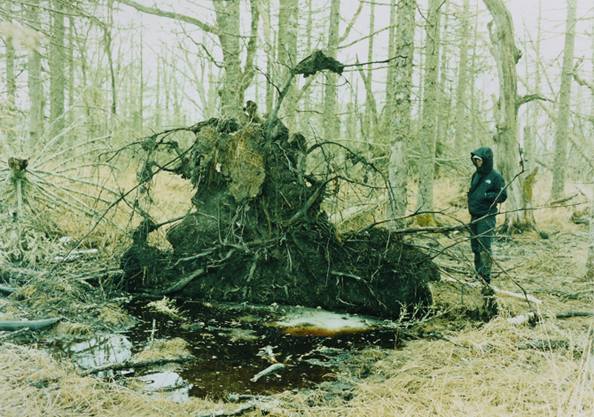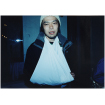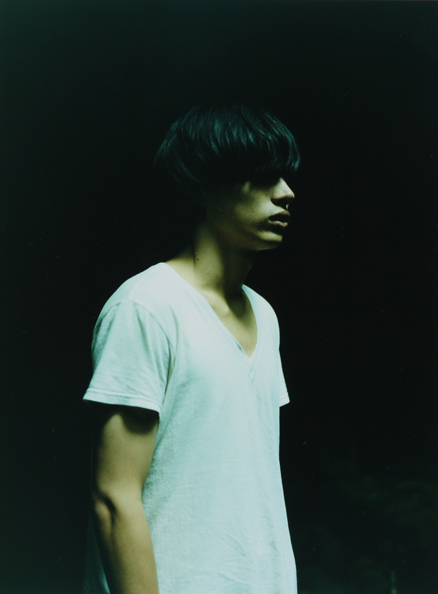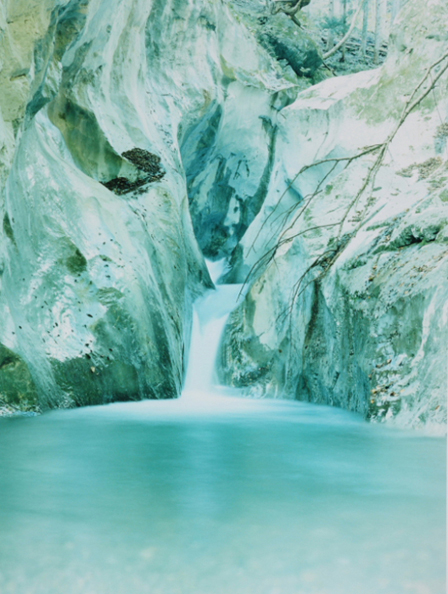Where does the coldness come from? What feeling creates a utopian expression?
We held an interview to have these queries answered.

SPACE CADET (referred to as SC): Why made you start photography?
Mayumi Hosokura(referred to as MH): When I was in highschool, there was vast popularity in ‘girly photo.’(a movement at the end of the 90’s where amateurs took photos of daily object.) Having been influenced I bought photobooks of the published photos from H and Rockin’ On magazines, which I purchased at the Maruzen Bookstore in Kyoto. I remember fondly about the end of highschool graduating trip to America. I read a page on STUDIO VOICE magazine about Photobooks now, and selected which ones I wanted to purchase in America, one of them was Jack Pierson. Also (laugh), HIROMIX. I started photography around in highschool.
SC : Were you involved in a photography activity group?
MH:In highschool there was a photography activity group but it was not active. Back then most girls owned a compact camera, like a BICmini which costs around 20,000yen which I used.
SC:Do you still have those photographs?
MH : I wonder (laugh). Though it would only be a filmstrip if they had survived.
After I attended Ritsumeikan University and joined the photography group circle. The people from the group were very passionate to the point of being pointless. Also one of my professors was from the contemporary art division, so for my senior thesis I wrote about Takuma Nakahira. Graduation was near and I job hunted for a moment, but I ended up enrolling into Nihon University College of Art.
SC : Is it difficult to transfer from Ritsumeikan school to the graduate course at Nihon University?
MH : It is not a graduate course, but I transferred into a different faculty. I wanted to study about the technical aspects too.
SC : Whilst at university, was receiving the Hitotsubo Award (now referred to as 1_WALL) a significant event?
MH : Yes, it was. Up until receiving the award, something did not feel clear.
SC : Were you taking different themes from now?
MH : I brought those photographs today.
SC : Let’s take a look.






SC : Your early works are great. The tone is colorful, gives off a feeling where there are abundant of things you want to challenge.
MH : There are similar nuances, but quite different from the present work.
SC : Did you get more motivated from receiving an award?
MH : I did get motivated. Also a feeling of approval, that it is fine to be taking photos.
SC : Though there are only small percent of people who works freelance without an agent.
MH : I did find a job, working two years as a studio assistant for a publishing company. Back then, I did not consider making a living off Art, but sought for a way to be financially stable to get by. Just because I won an award once, did not mean everything was going to be fine. I was rather realistic and calm, so I job hunted and ended up in the studio.
SC : When did you start working freelance? I would assume your encounter with Shigeo Goto is coming.
MH : When I was working in the studio for the publishing company, I was selected for the Hitotsubo award; Goto was one of the judge. I was not awarded, but from then on I started getting my photographs viewed regularly for feedbacks from him. Back then, I was lost in not knowing what I wanted to take, thus my work was blurry and cloudy. It was a period when I felt lost.
SC : Did you have that cloudy feeling after you quit the publishing company, and started to work for STUDIO VOICE?
MH : Yes, I quit the publishing company and had half a year gap till I started working for STUDIO VOICE. Though I still had that cloudy feeling.
SC : Why did you start working for STUDIO VOICE?
MH : I heard from an acquaintance that they needed an extra hand, so I got involved. The work at STUDIO VOICE has definitely connected me to what I do in the present. When we were doing special article on ‘Photography Books Today’ we had to copy 100 books. Each month we would introduce two or three new editions, so we were receiving new information constantly. I realized how it is important to look through. Till then, I judged like or disliking photograph on a shallow unthought-of reasoning. Though after going through 100 photobooks, I was able to view the photographs objectively, of why certain work was important or how it has affected other works, or the scope the photographs have traveled.
SC : It is individually you were able to judge each photographs, or as a series including the editing, you were able to judge whether the work was good or bad?
MH : As a whole work series, but also include the editing and as one photograph, so I guess in both ways.
SC : Having this interview illustrates that you acquire abundant of information.
MH : During college I would only look if it had interested me, though for work you were forced to look at everything. It turned out to be a fortunate experience.
SC : Not many people experience being forced to look at photographs. By that time, were you able to get rid of the cloudy feeling?
MH : No, I still carried the cloudiness. Though I did not comprehend it myself but there were days when I felt if I continued taking photos that I would start feeling good. Also at EXPOSED exhibition I met Bandai, Ukai and Kikuchi, also Yumiko Utsu at Hitotsubo; a year after we did a group exhibition at the magic room in Kiyosumi Shirakawa area. The event correlates to the period at STUDIO VOICE when I was scanning through the piles of photos. Seeing Bandai’s and Ukai’s photographs broke down my idea and convention of what photographs should be, it was striking sense. There were still plenty to learn, and soon after I took a break to organize matters within myself. I had to be exclusive on what subject to take, and an irritating period when I could not express it yet, through photography. Though one day, it came, and my words and the photographs synced.
SC : So something started to change gradually?
MH : Also the photo of Hori on the cover of ZINE was a big change.

SC : Having a good model is important, taking photos of Hori you can get comfortable with your skills. The distance you maintain with the model creates that sense of cool calmness. The subject or what is considered utopian often expresses a detached feeling like a cold wall. Why do you take around these subject?
MH : What is utopian anyways? If you categorize the subject, there is nude, nature, minerals, but none are utopian as an object or a theme.
When you question why you are capturing that certain subject, such as nude, because it spontaneously presents ‘Youth’ which urge you want to capture. You use to word ‘Youth’ because there is not another adequate word, but it is a record of it. Thus youth, beauty, or an ideal object if to word it differently could be utopian.
SC : Though you have no interest in middle school students?
MH : Recently I think it’s adequate to use middle school, high school students in works.
SC : On SPACE CADET, you have posted a photograph of a child. Why are you attracted to the notion of ‘Youth?’
MH : It is not necessary about appearing youthful. Such if I remained the same on the inside but appearance suggested eighteen, it is still different. Photographs cannot capture the inside, but only the youth on the exterior.
SC : Is it a feeling of whatever may be tomorrow?
MH : Not a way of life, but there is a feeling of unsteadiness.
SC : Unsteadiness compared to Youth accommodates better.
MH : There might be certain unsteadiness. Recently I read what Mishima Yukio said, that is it shameless to value only knowledge which is everlasting and items that will transform into money. It is important to value the physical human body, as its beauty disperses instantly.
I take the photo in the present or it will become lost instantly. Though I am not projecting any ideals, but perhaps stating that I am reluctant of it disappearing. Same time it’s better that is disappears.
SC : You do take photograph of a subject (body) who makes the audience invoke the feeling of anguish when it disperses?
MH : Choosing the subject is one’s preference. There are times I do not want to shoot the subject that other photographers would prefer. It is an important process when choosing the model.
SC : They do not resist in being nude?
MH : Boys do not really resist, especially when it is their top half only.
SC : Do you end up with the ideal work when the subject is nude?
MH : I want to conceal their personality as much as I can. It is better when the personality is covered; the t-shirt should be white, and even better if they are not wearing any clothes.
SC : The color of the photograph, is it your preference?
MH : It is my preference, though I am attempting to erase the sense of reality. I think it becomes too raw if shot in the normal light.
SC : The color blue is vibrant.
MH : More blue-green.
SC : The color yellow too has a strong presence.
MH : Yes, blue, green and yellow are most vibrant. According to the subject, I altemate the colors.

SC : Will you continue taking photographs?
MH : With the current series I am slightly loosing interest, so I am slowly approaching a new series.
SC : Do you have a concrete idea?
MH : That would be a secret. (laugh) I have taken it, but it is still sleeping. Though I will continue with the current series, I would like to do several short-term projects.
SC : Looking forward to the next series. Also what is your schedule for the future?
MH : I will be published in the Dutch Modern Photography Magazine ‘FOAM’ for the ‘Talent Issue’ in September 15th. Participating in a group exhibition in Rome, Italy from September 23rd. Followed by another group exhibition for ‘FOAM talent issue,’ in Amsterdam on October 13th. End of the year at G/P gallery I will hold a solo exhibition, and complimenting the exhibition another photo book will be published.
SC:You are successful.
MH : But I do not feel the actual sensation. (laugh).
August, 2011.